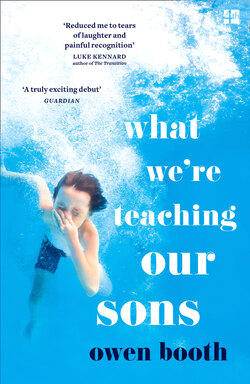Читать книгу What We’re Teaching Our Sons - Owen Booth - Страница 17
Emotional Literacy
ОглавлениеWe’re teaching our sons about emotional literacy.
We’re teaching them about the importance of understanding and sharing their feelings, of not being stoic and trying to keep things bottled up.
Because we are aware of the concept of toxic masculinity, we’re trying to make sure our sons grow into confident, well-balanced and emotionally open young men.
We’ve come to the park to ride on the miniature steam railway. The miniature steam railway is operated by a group of local enthusiasts who hate having to let children ride on their trains. The enthusiasts are all men.
‘How are you feeling?’ we shout to our sons, repeatedly, as we clatter around the track on the back of 1/8th scale trains. ‘What’s really going on with you? You can tell us. We’re listening.’
Our sons pretend they haven’t heard, try to ignore us. We don’t blame them. We can’t imagine talking about our feelings with other men either. The idea is horrifying. That’s why we all have hobbies.
We explain to our sons about our hobbies. About constructing and collecting and quantifying things, about putting stuff in order. Classic albums. Sightings of migratory birds. Handmade Italian bicycles. Like our fathers and their fathers and their fathers before them.
All those unknowable, infinitely quantifiable fathers.
Two of the steam enthusiasts are arguing with a customer who keeps letting his children stand up while the train is moving. Nobody wants to give ground. Eventually the customer leaves the park with his kids. He’s coming back, though, he tells us all. He’s going to sort this out.
We imagine the stand-off between the gang of ageing steam enthusiasts and the angry posse that the dissatisfied customer has, we assume, gone to recruit. The fist-fights on top of the moving trains. The driver slumping over the accelerator, the train barely speeding up, the terrifyingly slow-motion derailment, the ridiculously minor injuries. The clean-up costs and the story in the local newspaper.
‘Can we go home and play video games now?’ our sons ask.
We wonder, just for a second, how long it would take us to die if we threw ourselves in front of one of the trains. How many times we would need to be run over. How long we’d have to lie on the track. We imagine the confusion as the trains hit us again and again every few minutes, the slow realisation of what was happening, the spreading feeling of horror among the other passengers, the eventual screams.
We don’t know whether we’d have the force of will, not to mention the patience, to wait it out.
